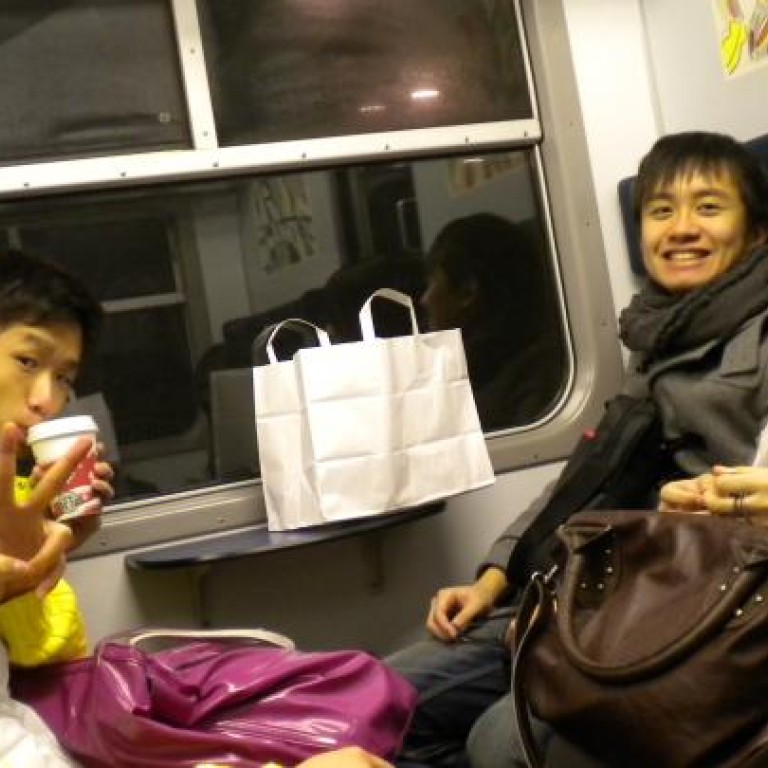
Happy campus
An increasing number of Hong Kong students are choosing to study abroad, writes Linda Yeung
At the age of 14, Keith Ho Ho-yin spent his first month at a British boarding school feeling bitterly homesick. Now a final-year chemistry major at University of Bristol, he is settled, has become more independent, and is happy mingling with people from various ethnic backgrounds.
Keith enjoys campus life and is busy with club activities at weekends. He is grateful his parents let him study his subject of choice, and sympathises with Hong Kong students whose parents pressure them to take subjects leading to well-paid jobs, such as those in medicine and law. Keith says his "funny" chemistry teacher inspired him to study science.
"Every week we had two lab sessions. Sometimes he would show us some interesting experiments after school. Chemistry is a really fun subject," says Keith, who returned to Hong Kong for the summer holiday. Choosing a subject he is passionate about has made his time in Bristol all the more worthwhile.
More and more Hong Kong students are studying overseas, particularly in Britain. The British Council reported a 37 per cent rise in Hong Kong applications for British universities this year, with a 32 per cent rise since 2008. Census statistics from last year show that of the 75,000 local students studying abroad, 26 per cent were in Britain, 24 per cent in Australia and 20 per cent in the United States. Ten per cent opted for places on the mainland.
More than two out of three overseas students are in tertiary education and 30 per cent in secondary schools.
For many students, Britain's multicultural environment is a big draw, as are its cultural gems and proximity to popular tourist destinations in Europe. Keith hopped onto the Eurostar to visit Paris with his schoolmates one Christmas, and has also made trips to Frankfurt and Amsterdam.
Gloria Mak, a social psychology major at the University of Essex, enjoyed sojourns in nearby London and also visited Amsterdam.
But a more important reason for overseas study is the greater variety of courses and availability of places. Hong Kong's new four-year undergraduate curriculum is intended to broaden the scope of learning, but competition for places has become keener now that all students have to sit the Hong Kong Diploma of Secondary Education examination.
While 20,000 of the 72,000 candidates met the minimum standard for subsidised places, just 14,800 were offered admissions.
Mak left Hong Kong after failing to get into her chosen university art programme. She switched to social psychology at Essex because of the strong reputation British universities have for social sciences
"There is little entertainment in Essex, but I still enjoy going to society events," she says. "I joined societies to learn about Bollywood dance, and enjoyed my lectures and classes because the subjects were what I really liked. I was inspired by some lecturers in a friendly and harmonious environment."
Maybe because Hong Kong's new secondary diploma is modelled on the American system, US community colleges are also starting to see an increase in the number of applicants. The number of local students bound for the US rose 1.3 per cent in the 2011-12 school year compared with 2010-11, after a 3.5 per cent drop the previous year.
Community colleges are accredited by the same national organisation that accredits universities, says Angel Lau, an education consultant based at the US Consulate in Hong Kong. In the early 2000s, she attended University of California, Riverside, after graduating from a community college. She says students appreciate a highly flexible curriculum.
"I was a bit lost in the beginning, coming from a rigid system where students were in either science or arts streams. In the States, there are so many options to explore. I did psychology, history and American history as a science student," says Lau, who later switched her major from science to business.
American universities also encourage students to take courses at other institutions, or even abroad, under a credit transfer system. "There are more than 900 majors offered by more than 4,800 universities in the US. It helps tap your potential," Lau says. "American students on the whole are friendly, and they like to form study groups. You do need to be self-motivated and prepared to ask questions. Scholarships and [other] aid are not restricted to top students."
Overseas students may also have the chance to top up their coffers. Britain, Australia and the US all allow them to work 40 hours a fortnight, with certain limitations. There may also be internship opportunities.
Anna Westbrook, spokeswoman for the Which Degree? Which University? Website, says with most Australian universities located in big cities, students are either offered work placements as part of their degree, or are able to work and seek internships at the same time as studying. "This ensures students leave university with theoretical and practical skills, ready to enter the workforce."
Australian universities also place great emphasis on environmental and Asian studies degrees, which are useful in the areas of science, international relations and law, she says, and students are challenged to learn broadly across a range of disciplines within their degrees.
But costs could still hold some back from going abroad. Mak, who shares spacious accommodation with 14 flatmates, says her tuition, accommodation and personal expenses come to about GBP000 (HK$251,000) a year. Tuition for US universities ranges from US$17,000 to US$50,000 a year, and it's A$20,000 (HK$161,000) to A$35,000 in Australia. Lau recommends thoroughly researching what is on offer before taking the leap.
